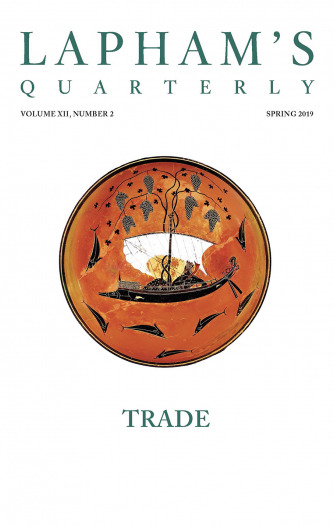All things are filled full of signs, and it is a wise man who can learn about one thing from another.
—Plotinus, 255Anamorphosis
Gazing at mirrors in Moscow.
I’m very fond of street mirrors. They pop up along your path. Your path is ordinary, calm—the usual city path, promising neither miracles nor visions. You’re walking along, not assuming anything, you raise your eyes, and suddenly, for a moment, it’s all clear to you: the world and its rules have undergone unprecedented changes.
Optics and geometry—the essence of what had been your motion, your movement, your desire to go exactly where you were going—have been laid waste. You start thinking you have eyes in back of your head; you even smile distractedly at passersby, you’re embarrassed by this advantage of yours.
“Ah,” you sigh quietly.
The trolley, which had just gone out of sight, again rushes in front of you, cutting across the edge of the boulevard like a knife through cake. A straw hat hanging on a blue ribbon over someone’s arm (just this minute you saw her, she caught your attention, but you didn’t think to look around), comes back now, floating past your eyes.
A vista opens up before you. You’re sure this is a building, a wall, but you have an advantage: it’s not a building! You’ve discovered a secret. There is no wall. Here you have a mysterious world, where everything you’ve just seen is repeated—and repeated with that vivid stereoscopic quality that is in the exclusive power of the binoculars’ wrong end.
You don’t know which way is up, as the saying goes. So suddenly have the rules been broken, so incredibly have the proportions changed. But you rejoice in your dizziness…Having guessed, you rush toward the blue square. Your face is suspended, motionless in the mirror, it alone has natural forms, it alone is a particle left over from the regular world, while everything else has collapsed, changed, and taken on a new regularity that you just can’t master, even after standing a whole hour in front of the mirror, where your face looks like it’s in a tropical garden. The vegetation is too green, the sky too blue.
You just can’t say for certain (until you turn away from the mirror) which direction a pedestrian you’ve observed in the mirror is headed…if you just turned around…
I watched myself in the mirror finishing my roll.
I turned around.
Someone was walking toward the mirror, having appeared from the side. I blocked his reflection. The smile he had prepared for himself came to me instead. He was a head shorter than me and looked up.
He rushed toward the mirror to find and flick off the caterpillar that had landed on the far end of his shoulder. And he did flick it off, twisting his shoulder forward like a fiddler.
I continued to think about optical illusions and mirror tricks and so asked this man before I recognized him, “Which direction did you come from? Where did you come from?”
“Where?” he repeated. “Where did I come from?” He looked at me with clear eyes. “I dreamed myself up.”
© 2004 Marian Schwartz. Used with permission of Mrs. Varvara Shkolvskaya-Kordi, heir at law of Yuri Olesha.

Yuri Olesha
From Envy. Born in modern-day Ukraine in 1899, Olesha came from Polish nobility, served as a telephone operator in the Red Army during the Russian Civil War, and then wrote verse under the pseudonym “The Chisel” for a railway workers’ journal to which Isaac Babel and Mikhail Bulgakov also contributed. Although Envy earned him initial praise—a favorable review appeared in Pravda—he was by the 1930s deemed by Soviet critics to be ideologically suspect.

